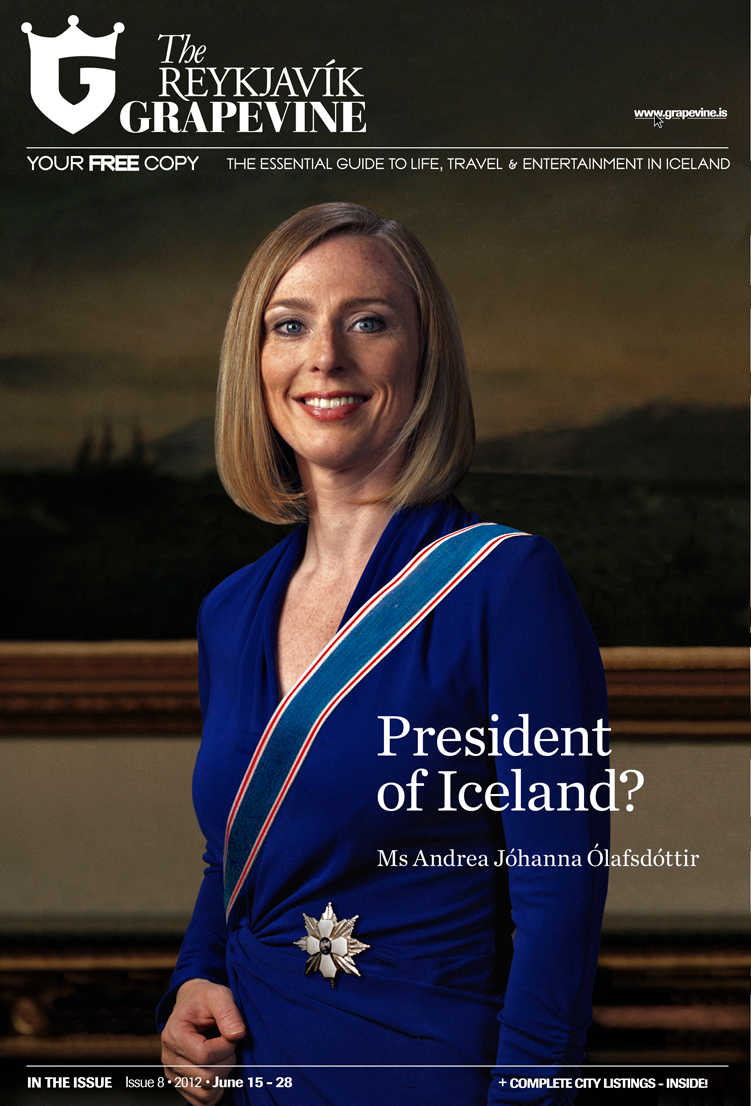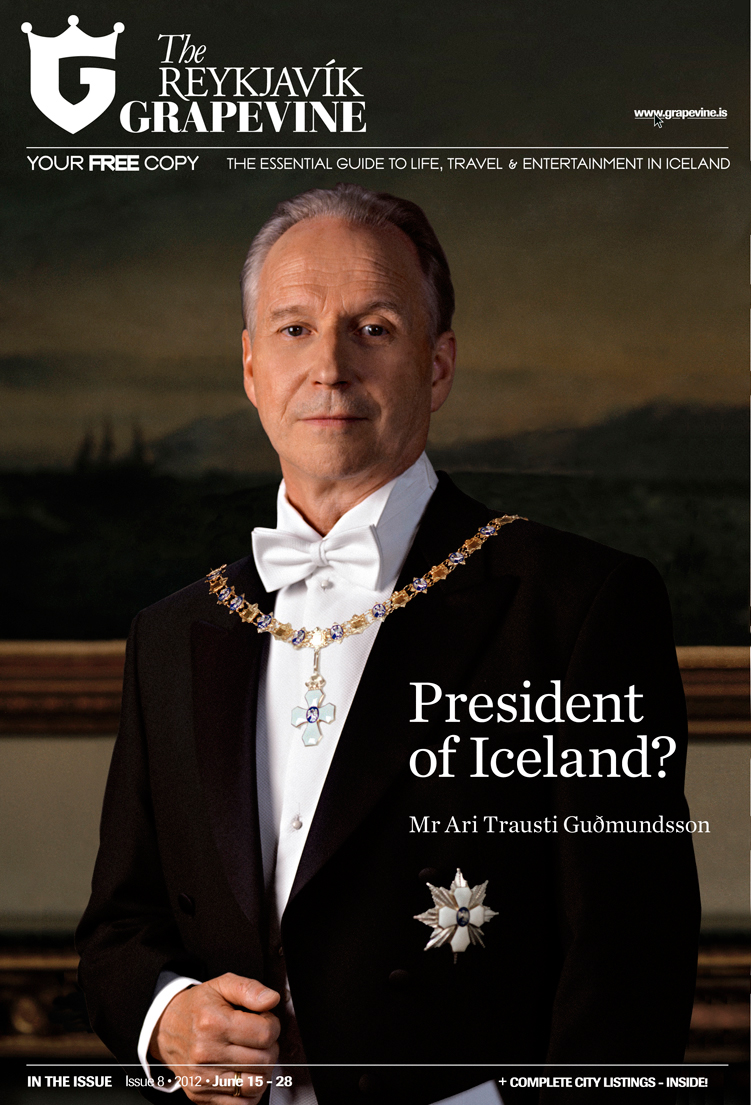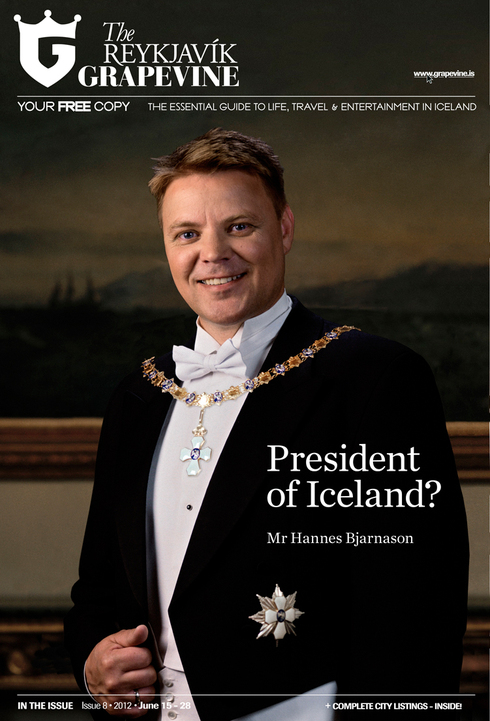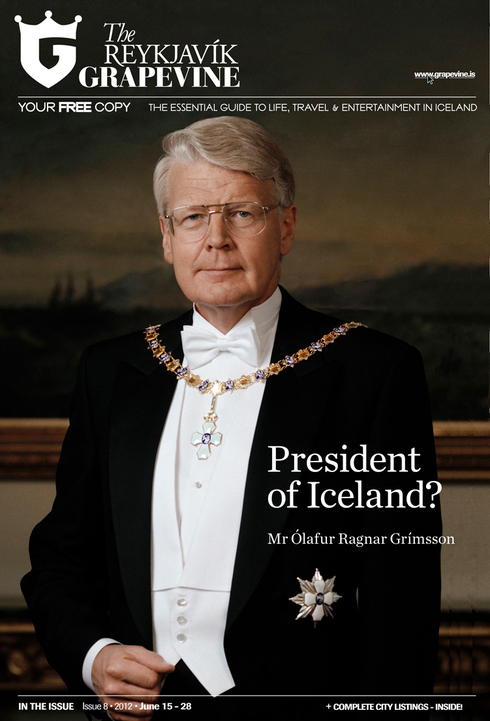Þóra Arnórsdóttir is a 37-year-old mother, journalist, and presidential candidate. As a reporter and game show host for the state-owned broadcasting corporation, RÚV, Þóra has been a near nightly guest in Icelandic living rooms for years, but she has formed a solid reputation as a journalist for her reporting of the Icelandic financial crisis. During this campaign, Þóra has emerged as the candidate most likely to challenge incumbent President Ólafur Ragnar Grímsson. Þóra and her husband, Svavar Halldórsson, have three children together, the youngest born mid-May this year. In addition, Svavar has three children from a previous relationship. We met Þóra at her home in the last days of her pregnancy to ask her about the campaign.
How is the mood at home?
The mood is very good, but obviously, this campaign has changed our plans slightly. We just bought a house, and we had planned on doing some renovation, and on top of that, we are expecting a baby in a few days. But maybe this havoc is what has kept us all grounded. I have been completely relaxed during the whole thing, but then again, everything has gone better than we dared hope for.
Your family life has come under the spotlight during this campaign. Many say that a woman who just gave birth belongs at home with the child and even that the father should not be put in the caretaker role. How do you two handle it?
Svavar and I are both career people and we have both worked full-time jobs in a demanding workplace while raising a family, much like most Icelandic parents do. We have always had to delegate the responsibilities at home. I’ve always said that equality is something that both sexes need to be responsible for. I think it is important that a 42-year-old male, with a good education and a steady job, is able to choose to stay at home with his children and support his wife without us, as a society, thinking that he has resigned his manhood. I’ve heard people claim that they could not vote for me, for the sake of the children, but it is not as if I was a stay-at-home mom before! I have never neglected my children as a working mother and I don’t expect to do so in this job either. It is not like Icelandic women in the past have been sitting idly with their feet up in the air.
DECIDING TO RUN
At some point in the run up to this election, your name started to be mentioned as a possible presidential candidate. When did you consider this an option yourself? What pushed you to take the step?
It started with a few people mentioning the idea to me. I received letters and emails, both from people I know and complete strangers, urging me to consider the possibility. At first I just thanked people for showing me this trust, but I didn’t really give it more thought.
In March, this started to gain some momentum and at that time it would probably have been easy to get swept up in the commotion, but the essential question for me was still if this was actually something that I wanted to do. I felt that I had an obligation to all the people who had contacted me then to at least give the question some consideration. Around the same time, there was a national poll that showed that the support was wider than just the people around me—it is easy to get wrapped up in the bubble of people around you. But you can’t really run for someone else, you can only do it for yourself, so that was the big headache. Then I started to think objectively about the Office of the President of Iceland. What does the position entail? Is this something that I could do? Could I do some good in that post?
I spent a lot of time thinking about these questions. I also thought about my last few years as a reporter. It was a lively job in 2008, following the economic crash, then came 2009 and 2010, and nothing much changed. I recently reread the Special Investigative Committee Report [SIC Report] on the crash, in particular the chapters that deal with ethics and our political system, and nothing had really changed. Now, the Office of the President cannot reform our political debate directly, but I believe it can influence it a lot.
In my opinion, the president has three kinds of power. We have heard a lot about the Article 26 of the constitution[1], but I believe that we should only have to face that question under very special circumstances. The President also has an important role in forming a new government following an election. But the most important power is the power of influence. The President should not be speaking from above, he does not wield a political power, but he has a great power of influence.
I think we have all felt a strong need for a change in this country. Iceland is a small country, and we pretty much agree on how this society should be. We should be able to move forward without constant fighting. But lately I’ve met a lot of people who avoid following the news, avoid participating in a political debate, and avoid having an opinion on social matters; because, if you express an opinion, you are setting yourself out to be put down.
This is what I thought about when I was making this decision, and in the end I came to the conclusion that I should run.
PRESIDENTIAL QUALITIES
During this process, what qualities in yourself did you put up on the scales? How do you come to the conclusion that you are the right person to become a president of a nation?
I think a president must be able to communicate and have good interpersonal skills, both domestically and internationally. The ability to talk, and identify, with the people in the country is important. I love this country, I worked as a tour guide for years, and I have gotten to know people all around Iceland. I am educated in philosophy, economics and international politics, and for the last few years I have more or less worked with speaking to visiting foreign experts as a reporter for RÚV. I believe I can handle that part well, that is, representing the country. We are a small nation, and it is important that we benefit from the connections that are made through the power of the Office of the President. I have been asked if I believe the position of president should even exist. Whether we need it? I believe we do, and this would be a big part of the reason why; there are doors that can be opened solely through the power of the Office of the President.
What about yourself? Which of your qualities do you find to be “presidential”?
We are just ordinary people, really. I believe a president should have simple qualities. He or she must honour certain values, namely moderation, humility, and respect for the people and its country. As I said before, to be able to communicate with the people is the most important quality to have for this country’s only nationally elected official. And to communicate in a language that everyone understands, so that everyone knows what he or she means.
I don’t regard the Office of the President as a political post, but the president must be able to earn trust, both the trust of the people and the political leaders, who must be able to trust that he acts in accordance to his own best judgment and on behalf of the people, and not on behalf of some other interests. I think that’s it, mostly … It is very difficult to answer this question without sounding arrogant. When I look at the Office of the President, what I believe it stands for, and should stand for, I believe I can take it on and do it justice.
A DIFFERENT TAKE
What about the Office itself? The current president has shaped the role of the president considerably, and even changed how we view it[2]. Do you agree with these changes to the Office?
I think all five presidents of Iceland have shaped the position during their time, and I would do so as well. It is my opinion that the president should not be a direct participant in political issues. He should watch over the democratic process and allow that to play out without taking a side. But this is perhaps exactly what I don’t want this election to be about. You will never hear me say a derogatory word about our current President, or other candidates. This election is not about judging his sixteen years in office. We know what he is as a president, and we know what he stands for. I am offering something else. I don’t want the campaign to be about what I would have done in the same situation, or if I agree with this or that decision, or how he has changed the Office during his time. I don’t think it is important.
In the same manner, when you decide to run for president, you must be implying as well that you want to do things differently?
Well, I also believe that nobody should be president for more than 8 to12 years. Sixteen years is a long time. My reasons for running for Office were not to “take on” the incumbent president. It is rather that he is on this track, and we know where it leads, but there are a lot of people who want changes, and I am obviously one of those people. Otherwise I wouldn’t be running. This is all a part of the democratic process.
—
[1] Article 26 of the Icelandic constitution authorises the President to refuse to ratify a law passed by the parliament, and thereby automatically moving it to a national referendum. This authorisation was first exercised by Ólafur Ragnar Grímsson in 2004, and again in 2010 and 2011. Before the article was first exercised in 2004, it was widely considered to be invalid as it would go against Parliamentary sovereignty.
—
Full name: Þóra Arnórsdóttir
Born: February 18, 1975 in Reykjavík (Age 37)
Education: BA in philosophy from the University of Iceland; MA in international and development economics from Johns Hopkins School of Advanced International Studies
Occupation: Þóra is a television journalist, news editor and quiz show host with the Icelandic National Broadcasting Service (RÚV). She has hosted a variety of pieces for television and radio, served as a tour guide for international travellers, as well as lectured in International Relations at the University of Iceland.
Tidbit: Though most of Þóra’s journalistic work has focused on Icelandic news and politics, she has also worked on a documentary about the Dalai Lama and the Tibetan Buddhist community in exile.
—
Read interviews with the other candidates:
 Andrea Ólafsdóttir
Andrea Ólafsdóttir Ari Trausti Guðmundsson
Ari Trausti Guðmundsson Hannes Bjarnason
Hannes Bjarnason Ólafur Ragnar Grímsson
Ólafur Ragnar Grímsson
Buy subscriptions, t-shirts and more from our shop right here!

















